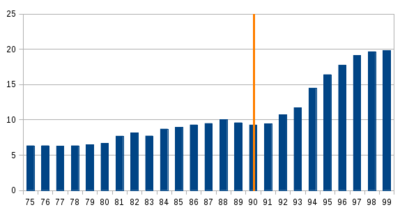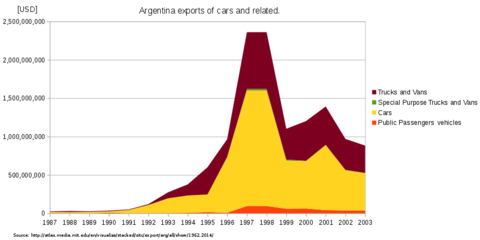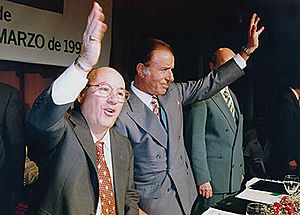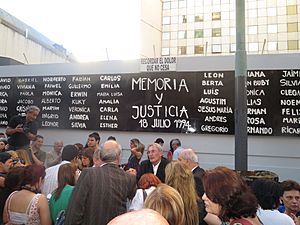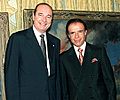Carlos Menem facts for kids
Quick facts for kids
Carlos Menem
|
|
|---|---|
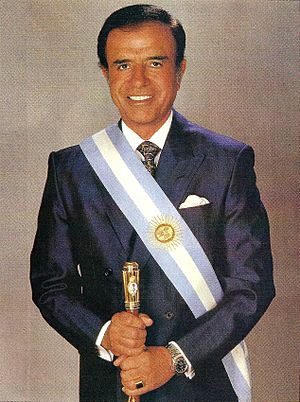
Official presidential portrait, 1995
|
|
| President of Argentina | |
| In office 8 July 1989 – 10 December 1999 |
|
| Vice President |
|
| Preceded by | Raúl Alfonsín |
| Succeeded by | Fernando de la Rúa |
| National Senator | |
| In office 10 December 2005 – 14 February 2021 |
|
| Preceded by | Eduardo Menem |
| Constituency | La Rioja |
| President of the Justicialist Party | |
| In office 28 November 2001 – 11 June 2003 |
|
| Preceded by | Rubén Marín |
| Succeeded by | Eduardo Fellner |
| In office 10 August 1990 – 13 June 2001 |
|
| Preceded by | Antonio Cafiero |
| Succeeded by | Rubén Marín |
| Governor of La Rioja | |
| In office 10 December 1983 – 8 July 1989 |
|
| Vice Governor | Alberto Gregorio Cavero |
| Preceded by | Guillermo Jorge Piastrellini (de facto) |
| Succeeded by | Alberto Gregorio Cavero |
| In office 25 May 1973 – 24 March 1976 |
|
| Vice Governor | Libardo Sánchez |
| Preceded by | Julio Raúl Luchesi (de facto) |
| Succeeded by | Osvaldo Héctor Pérez Battaglia (de facto) |
| Personal details | |
| Born |
Carlos Saúl Menem
2 July 1930 Anillaco, La Rioja, Argentina |
| Died | 14 February 2021 (aged 90) Buenos Aires, Argentina |
| Resting place | San Justo Islamic Cemetery |
| Political party | Justicialist Party |
| Other political affiliations |
|
| Spouses | |
| Children | 4, including Zulemita |
| Relatives | Eduardo Menem (brother) |
| Signature |  |
Carlos Saúl Menem (born July 2, 1930 – died February 14, 2021) was an Argentine lawyer and politician. He served as the President of Argentina from 1989 to 1999. During his time as president in the 1990s, he brought in new economic ideas. He was also the leader of the Justicialist Party for many years. His way of leading was known as Federal Peronism.
Menem was born in Anillaco to a family from Syria. He grew up as a Muslim but later became a Roman Catholic to pursue a career in politics. He became interested in Peronism after visiting Buenos Aires. He led the Peronist party in his home province of La Rioja. He was elected governor there in 1973.
He was removed from office and held for a time during a military takeover in 1976. He was elected governor again in 1983. In 1989, he won the presidential elections. The previous president, Raúl Alfonsín, resigned early due to very high inflation and public unrest. This meant Menem became president sooner than planned.
As president, Menem worked to control inflation with a plan called the Convertibility Plan in 1991. This plan helped the economy at first. Argentina also started talking with the United Kingdom again after the 1982 Falklands War. The country also became close with the United States. During his presidency, Argentina faced two serious attacks.
In 1994, the Argentine Constitution was changed. This allowed Menem to run for re-election in 1995, which he won. Later, a new economic challenge began. Other political parties joined forces and won the elections in 1997 and 1999. Menem faced some legal challenges after his presidency. He ran for president again in 2003 but decided to step down before the final vote. This led to Néstor Kirchner becoming president.
In 2005, Menem was elected as a senator for La Rioja. He passed away in 2021 at the age of 90. At that time, he was the oldest living former Argentine president. His time as president is seen differently by different people in Argentina.
Contents
Early Life and Education
Carlos Saúl Menem was born on July 2, 1930. He was born in Anillaco, a small town in La Rioja Province, Argentina. His parents, Saúl Menem and Mohibe Akil, were from Syria. They had moved to Argentina.
He went to elementary and high school in La Rioja. He also played basketball during his university studies. In 1951, he visited Buenos Aires with his team. There, he met President Juan Perón and his wife Eva Perón. This meeting inspired Menem to become a Peronist. He studied law at the National University of Córdoba and finished his studies in 1955.
After President Juan Perón was removed from power in 1955, Menem was briefly held. He then joined the Justicialist Party, which was the new name for the Peronist Party. In 1973, he was chosen to lead the party in La Rioja Province. He was part of the group that helped bring Perón back to Argentina from his long exile in Spain.
Governor of La Rioja
First Term (1973–1976)
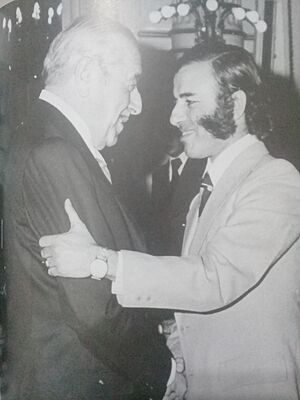
Menem was elected governor of La Rioja in 1973. This happened when the ban on the Peronist party was lifted. He was removed from his position during a military takeover in 1976. This event also removed President Isabel Perón from power.
Menem was held starting on March 25. He was kept in a local barracks for a week. Then, he was moved to a temporary prison on a ship in Buenos Aires. He was held with other former ministers and union leaders. He shared a cell with Juan Perón's personal doctor. During this time, he helped the chaplain, even though he was still a Muslim. In July, he was sent to a permanent prison in Magdalena. His wife, Zulema, visited him every week. Menem's mother passed away while he was in prison. The government did not allow him to attend her funeral. He was released on July 29, 1978. He had to live in a city outside his home province. He settled in Mar del Plata.
Menem met Admiral Eduardo Massera, who wanted to become president. He also had public meetings with famous people. Because of this, he was forced to live in another city, Tandil. He had to report to the police chief every day. This restriction was lifted in February 1980. He returned to Buenos Aires and then to La Rioja. He started his political activities again, even though it was forbidden. He was held again. His new forced residence was in Las Lomitas in Formosa. He was one of the last politicians to be released from prison by the military government.
Later Terms (1983–1989)
Military rule ended in Argentina in 1983. Raúl Alfonsín from the Radical Civic Union party was elected president. Menem ran for governor again and won by a large number of votes. The province grew industrially because of special tax rules from the military government. His party gained control of the provincial government. He was re-elected in 1987 with 63% of the votes.
At that time, the Justicialist Party was divided. Some members were conservative and supported old ideas. Others wanted to update the party. These disagreements stopped in 1987. Menem's big victory made him a key figure in the party. He then sought to become its leader.
Presidential Elections
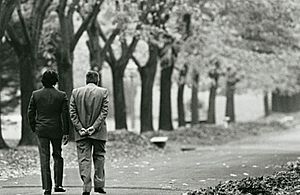
Antonio Cafiero, who was the governor of Buenos Aires Province, was seen as the most likely candidate for president from the Justicialist Party. Menem, however, was seen as a leader who appealed directly to the people. He brought together many different political figures. Because of this, he won against Cafiero in the party's primary elections. He promised a "revolution of production" and big wage increases. His campaign slogans were ¡Siganme! (Follow me!) and ¡No los voy a defraudar! (I won't let you down!).
The elections took place on May 14, 1989. Menem won by a large margin and became the president-elect. He was supposed to take office on December 10. However, inflation got much worse, leading to very high prices and public unrest. The outgoing president, Alfonsín, resigned early. He transferred power to Menem five months earlier, on July 8. This was the first time since 1916 that a president peacefully handed over power to an elected leader from a different party.
Presidency
Economic Policy
Very high inflation made Menem change his party's usual economic ideas. He chose a policy that focused on saving money and a market-based economy. Many economists at the time believed the best solution was to reduce government spending. They also thought it was good to open up to international trade.
The crisis was very serious. Menem feared he might also have to resign. So, he adopted these new economic ideas. He moved away from the traditional policies of Peronism.
Congress passed laws for economic emergency and state reform. These laws allowed President Menem to reduce or remove government support. They also allowed him to sell state-owned businesses. The first ones sold were telephone and airline companies. These sales helped foreign lenders. Even with more tax money and money from sales, the economy was still not stable.
A new economy minister, Antonio Erman González, introduced a plan to convert bank deposits into government bonds. This plan helped reduce inflation but also caused a slowdown in the economy. He also cut social welfare spending.
His fourth economy minister, Domingo Cavallo, was appointed in 1991. He made the economy even more open. The Convertibility Plan was approved by Congress. It set the value of the new peso equal to the United States dollar. This law also tried to limit government spending, but this was often ignored. Under Cavallo, there was more free trade. Taxes on sales and earnings were high to reduce the government's debt.
At first, the plan was a success. Money stopped leaving the country, interest rates went down, and inflation dropped. Economic activity increased. In that year, the country's total production grew by 10.5%.
The money from selling state companies helped Argentina buy back many of its bonds. Selling electricity, water, and gas services was more successful than earlier sales. YPF, the national oil company, was also partly sold. The government kept a large part of its shares. The plan to privatize pension funds was debated in Congress. It was approved as a mixed system, allowing both public and private options for workers.
While the Convertibility Plan had good short-term results, it caused problems later. Many workers from the privatized companies lost their jobs. Unemployment grew to over 10%. Free trade and high costs in dollars made private companies also reduce staff. Unions found it hard to resist these changes. People with low incomes, like retirees, suffered from tax increases while their wages stayed the same. Some provinces experienced violent protests. To help with these problems, the government started social programs. It also brought back some protective policies for certain parts of the economy. It became hard for Argentine companies to export. Easy imports hurt most local producers. The national budget soon had a deficit.
Cavallo then started a second wave of privatizations. This time, it included the national postal service and nuclear power plants. He also limited the money given to the provinces. Menem continued to support him, even with growing opposition.
The Mexican Tequila Crisis of 1994 affected Argentina's economy. It caused a deficit, a recession, and higher unemployment. The government cut public spending further. They also reduced the wages of state workers and raised taxes. The deficit and recession decreased, but unemployment remained high. The country's debt to other countries increased. The crisis also showed that the economic system was vulnerable to money leaving the country quickly.
Growing unhappiness about unemployment led to Cavallo being replaced. Roque Fernández became the new minister. Fernández continued to cut government spending. He increased fuel prices, sold the remaining state shares of YPF, and fired state employees. He also raised the sales tax to 21%. New labor laws faced resistance and were not approved.
Economic problems in Asia in 1997 and Russia in 1998 also affected Argentina. These problems lasted longer and led to a depression.
Domestic Policy
Menem started his presidency by working with people from different political groups. He appointed conservative opposition members and business people to his team. To prevent legal challenges to his privatization plans, the number of judges in the Supreme Court was increased. The new judges usually supported Menem's decisions. Other groups that limited the president's power were also brought under control. When Congress disagreed with his ideas, he sometimes used special decrees. These decrees allowed him to pass laws without Congress's approval. He even thought about dissolving Congress, but he never did.
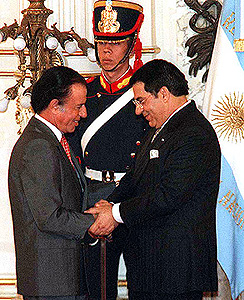
In 1990, a corruption scandal known as "swiftgate" happened. This led to many ministers resigning. Cavallo became the economy minister, and his successful economic plan made him very important. Both Menem and Cavallo wanted credit for the economic plan.
Antonio Cafiero, a political rival, could not change the constitution of Buenos Aires province to run for re-election. Eduardo Duhalde stepped down as vice president and became the new governor in the 1991 elections. This made Buenos Aires a strong base for him. Menem also chose famous people without political experience to run for office. These included singer Palito Ortega and racing driver Carlos Reutemann. The elections were a big success for the Justicialist Party. After these elections, most of the party supported Menem's leadership.
The opposition from the Radical Civic Union (UCR) was small. The party was still recovering from the 1989 crisis. With his strong political influence, Menem proposed changing the constitution. This change would allow him to run for re-election. His party did not have enough votes in Congress to make this happen. The Justicialist Party was divided. Some politicians wanted to replace Menem in 1995. The UCR was also divided. Alfonsín was against the idea, but other governors were open to talks.
Menem's victory in the 1993 elections strengthened his proposal. It was approved by the Senate. Menem called for a public vote on the proposal to put more pressure on the Radical deputies. He also sent a bill to Congress to change the voting requirements. Alfonsín met with Menem and agreed to support the proposal. In return, there would be changes to limit presidential power. This agreement is known as the Pact of Olivos.
The capital city of Buenos Aires would be allowed to elect its own leader. Presidential elections would use a system where if no one wins a majority, there's a second vote. The president could only be re-elected once. The system for choosing judges would change. Also, the special decrees used by the president would have less power.
Menem won the 1995 elections with over 50% of the votes. The UCR finished third for the first time.
After his re-election, growing unemployment led to more public resistance against Menem. There were protests in the provinces. Unions opposed the economic policies. Opposition parties organized the first cacerolazos, which are protests where people bang pots and pans. Teachers' unions set up a "white tent" in a plaza to protest. The first piqueteros (protesters blocking roads) appeared. This protest method was soon copied across the country.
Menem's power within the Justicialist Party was also questioned. He could not run for another re-election. The party looked for a candidate for the 1999 elections. This led to a strong rivalry with Duhalde, who was the most likely candidate. Menem tried to hurt Duhalde's chances. He proposed a new change to the constitution to allow unlimited re-elections for himself. He also started a legal case, saying that not being able to run for a third term was unfair. Several scandals happened. The Justicialist Party lost the 1997 elections to a new political group called the Alliance. The Supreme Court confirmed that Menem could not run for a third re-election. Duhalde became the party's candidate for president but lost to Fernando de la Rúa from the Alliance.
Foreign Policy
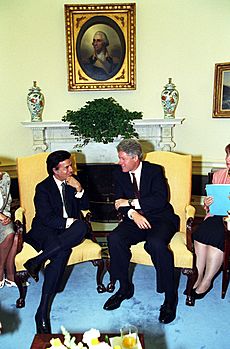
During Menem's presidency, Argentina became very close with the United States. Menem had good relationships with U.S. presidents George H. W. Bush and Bill Clinton.
Argentina left the Non-Aligned Movement. This was a group of countries that did not formally align with any major power bloc. The country also stopped its missile program. Argentina supported all of the U.S.'s international positions. It sent forces to the Gulf War and to help keep peace after the Kosovo War.
Argentina was accepted as a major non-NATO ally. However, it did not become a full member of NATO.
Menem's government also started talking with the United Kingdom again. Relations had been stopped since the Falklands War. This happened after Margaret Thatcher left office in 1990. Discussions about the Falkland Islands sovereignty dispute were put on hold. The focus shifted to talking about fishing rights.
In 1991, Menem became the first Argentine head of state to visit Israel. He offered to help Israel and Syria talk about the Golan Heights. However, relations between Argentina and Israel were later strained. This was due to a lack of progress in investigations into attacks on the Israeli embassy and a Jewish community center in Buenos Aires.
In 1998, Menem visited Russia. He met with Russian president Boris Yeltsin. Menem expressed his strong anti-communist views. He congratulated Yeltsin for "defeating communism" in Russia.
Chile
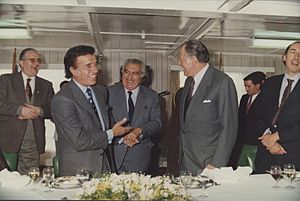
Menem also resolved all remaining border issues with Chile. The dispute over Del Desierto Lake was settled by international arbitration, favoring Argentina. The only exception was a dispute over the Southern Patagonian Ice Field, which is still unresolved.
Menem had voted for a peace treaty with Chile in 1984. This was different from other Peronist leaders. Chilean president Patricio Aylwin was at first unsure about Menem. However, Aylwin later changed his mind. He once said, "this Turk wins everybody over." Aylwin's successor, Eduardo Frei Ruiz-Tagle, had a very warm relationship with Menem. Former Chilean foreign minister José Miguel Insulza remembers meetings where they talked about politics and football. Because of this, some critics called Menem "pro-Chilean." Chilean President Sebastián Piñera later called him "a good friend of Chile."
Armed Forces
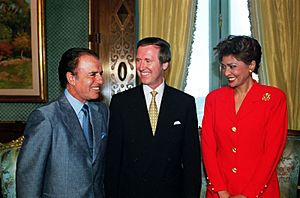
Argentina was still dealing with the effects of the Dirty War (which ended in 1983). Menem wanted to bring the country together. First, he arranged for the body of Juan Manuel de Rosas to be brought back to Argentina. Rosas was a controversial governor from the 19th century. Menem hoped to unite his legacy with other historical figures. He wanted this to be a symbol for healing from the Dirty War. While bringing Rosas's body back was successful, getting people to accept the military regime was not.
Military leaders from the time of the Dirty War, who had been found guilty in 1985, received presidential pardons. This happened despite public opposition. This had been a request from some military groups in previous years. However, Menem did not make the military changes they wanted. A colonel, Mohamed Alí Seineldín, who was also pardoned, started another uprising. Two military men were killed. Unlike earlier uprisings, the military fully followed Menem's orders to stop it forcefully. Seineldín was defeated and sentenced to life in prison. This was the last military uprising in Argentina.
The president made big cuts to the military budget. He also sold military factories to private companies. Menem appointed Lt. Gen. Martín Balza as the Army's General Chief of Staff. Balza had done well in stopping Seineldín's uprising. In 1994, a soldier died during conscription (required military service). This led to the end of conscription in Argentina. The next year, Balza spoke out against the military's actions during the Dirty War. He said that just following orders did not excuse what happened.
Terrorist Attacks
On March 17, 1992, the Israeli embassy in Buenos Aires suffered a terrorist car bomb attack. Many people believed this was because Argentina had been involved in the Gulf War. Although Hezbollah said they were responsible, the Supreme Court looked into other possibilities. The Court later said Hezbollah was responsible for the attack in May 1999.
On July 18, 1994, the Argentine Israelite Mutual Association (AMIA) suffered another terrorist attack with a car bomb. Eighty-five people died. This was the most destructive terrorist attack in Latin American history. The attack was widely condemned. Many people protested at the Congressional plaza, but Menem did not attend. The legal case remained unsolved during the rest of Menem's presidency.
On March 15, 1995, Menem's son, Carlos Menem Jr., died while flying a helicopter. The helicopter reportedly hit power lines and crashed. Menem had accused the group Hezbollah of killing his son.
After the Presidency
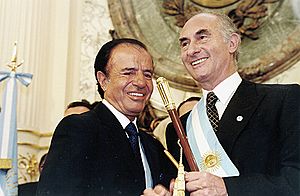
Menem ran for president again in 2003. He won the most votes in the first round, about 24%. However, votes were split among many parties. Under the 1994 change to the constitution, a candidate could win if they got 45% of the vote. Or, they could win with 40% if they were 10 points ahead of the next candidate. This meant Argentina would have its first-ever second round of voting. It would be between Menem and Néstor Kirchner, who came in second. The second round was set for May 18.
By that time, Menem was not very popular. Polls showed he would likely lose to Kirchner. Most polls predicted Kirchner would get at least 60% of the votes. To avoid a big loss, Menem withdrew his candidacy on May 14. This effectively made Kirchner president.
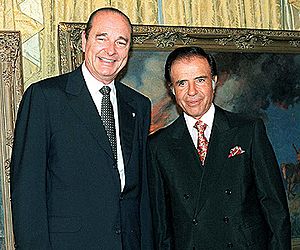
Ángel Maza, the governor of La Rioja, was allied with Menem. He had campaigned for him. However, financial problems in the province made Maza switch his support to Kirchner. This further weakened Menem's influence. In June 2004, Menem announced he had started a new group within the Justicialist Party. He said he planned to run in the 2007 election. In 2005, news reports said he was trying to form an alliance with his former economy minister, Cavallo. Menem said these were only early talks, and an alliance did not happen. In the October 23, 2005 elections, Menem won a minority seat in the Senate. He represented his home province.
Menem ran for Governor of La Rioja in August 2007. However, he was defeated. He finished in third place with about 22% of the votes. This was seen as a big loss. It showed that his political power in La Rioja was ending. It was the first time in 30 years that Menem had lost an election. After this defeat, he withdrew his candidacy for president. In late 2009, he said he wanted to run for president again in the 2011 elections. But instead, he ran for a new term as a senator. In 2019, he joined the Frente de Todos' Senate group until his death in 2021.
Legal Challenges
On June 7, 2001, Menem was arrested. This was related to a case about illegal weapons exports. The case involved exports to Ecuador and Croatia in 1991 and 1996. He was held under house arrest until November. He appeared before a judge in August 2002 and denied all accusations. Menem and his second wife, Cecilia Bolocco, moved to Chile. Argentine legal authorities repeatedly asked for Menem to be sent back to Argentina. This was to face charges of misusing public money. Chile's Supreme Court rejected this request. Under Chilean law, people cannot be sent back for questioning. On December 22, 2004, after the arrest warrants were canceled, Menem returned to Argentina. He still faced charges of misusing funds and not declaring illegal money in a Swiss bank. He was found innocent of those charges in 2013.
In August 2008, the BBC reported that Menem was being investigated. This was for his role in an explosion in 1995. This explosion was thought to be part of the weapons case involving Croatia and Ecuador. An Appeals Court later found Menem guilty of aggravated smuggling. On June 13, 2013, he was sentenced to seven years in prison. This was for his role in illegally sending weapons to Ecuador and Croatia. His position as a senator gave him protection from being put in jail. Also, because of his age (82), he could be under house arrest. His defense minister during the weapons sales also received a prison sentence. Menem was scheduled to attend a trial related to this on February 24, 2021. However, he passed away ten days before that.
In December 2008, a German company called Siemens agreed to pay a large fine. This was to settle accusations of bribery. The settlement showed that Menem had received about US$2 million in bribes from Siemens. This was in exchange for giving them a contract to produce national ID cards and passports. Menem denied the charges but agreed to pay a fine.
On December 1, 2015, Menem was also found guilty of misusing public money. He was sentenced to four and a half years in prison. His economy minister, Domingo Cavallo, and his former justice minister also received prison sentences. They were ordered to pay back large amounts of money from illegal bonuses.
Illness and Death
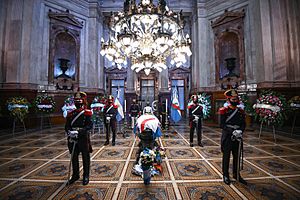
On June 13, 2020, Menem was hospitalized with a severe case of pneumonia. He was placed in intensive care. He tested negative for COVID-19. He was discharged on June 29, 2020, three days before his 90th birthday. On December 15, 2020, he was hospitalized again due to a urinary infection. On December 24, 2020, Menem was put into a coma after his kidneys failed.
He passed away on February 14, 2021, in Buenos Aires. The cause was complications from a urinary tract infection. The national government declared three days of national mourning. A public funeral was held at the Palace of the Argentine National Congress. Many politicians attended, including President Alberto Fernández. Hundreds of people also came. He was buried at the San Justo Islamic cemetery the next day, next to his son. His daughter confirmed that he had died as a Catholic. However, he was buried according to Muslim traditions to be with his family.
Former presidents usually have a statue at the Hall of Busts in the Casa Rosada eight years after leaving office. By the time of his death, Menem had not received this honor. President Alberto Fernández told Menem's daughter that they planned a ceremony once Menem recovered. Unfortunately, he passed away.
Style and Legacy
In his early days, Menem had an image similar to old Argentine leaders called caudillos. He styled his sideburns in a similar way. His presidential inauguration was attended by several gauchos (Argentine cowboys).
Unlike traditional Peronist leaders, Menem did not hold huge rallies in the Plaza de Mayo. Instead, he used mass media like television a lot.
Menem's time as president has been viewed differently by various people.
Honours
Foreign Honours
 Croatia:
Croatia:
 Egypt:
Egypt:
 Jamaica:
Jamaica:
 First Class of the Order of Jamaica
First Class of the Order of Jamaica
 Lithuania:
Lithuania:
 Italy:
Italy:
 Knight Grand Cross with Collar Order of Merit of the Italian Republic (1992)
Knight Grand Cross with Collar Order of Merit of the Italian Republic (1992)
 Malaysia:
Malaysia:
 Panama:
Panama:
 Peru:
Peru:
 Poland:
Poland:
 Spain:
Spain:
 Collar of the Order of Isabella the Catholic
Collar of the Order of Isabella the Catholic
 South Africa:
South Africa:
 Tunisia:
Tunisia:
 Grand Cordon of the Order of the Republic of Tunisia (1997)
Grand Cordon of the Order of the Republic of Tunisia (1997)
 Uruguay:
Uruguay:
 United Kingdom:
United Kingdom:
 Honorary Knight Grand Cross of the Order of St Michael and St George (1998).
Honorary Knight Grand Cross of the Order of St Michael and St George (1998).
Images for kids
See also
 In Spanish: Carlos Menem para niños
In Spanish: Carlos Menem para niños
 | Precious Adams |
 | Lauren Anderson |
 | Janet Collins |


